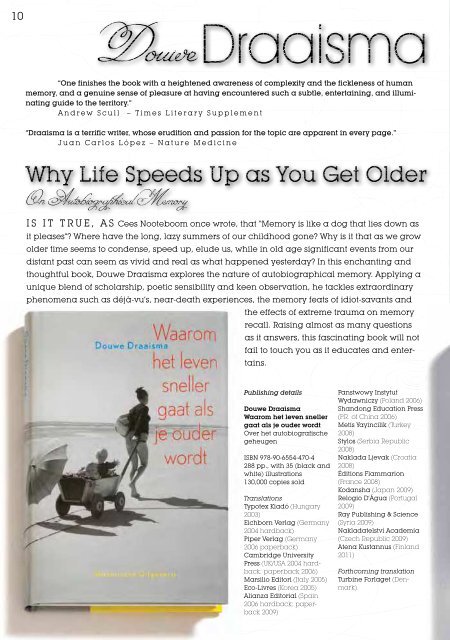IN THE MORE THAN - Historische Uitgeverij
IN THE MORE THAN - Historische Uitgeverij
IN THE MORE THAN - Historische Uitgeverij
You also want an ePaper? Increase the reach of your titles
YUMPU automatically turns print PDFs into web optimized ePapers that Google loves.
10<br />
“One finishes the book with a heightened awareness of complexity and the fickleness of human<br />
memory, and a genuine sense of pleasure at having encountered such a subtle, entertaining, and illuminating<br />
guide to the territory.”<br />
A n d r e w S c u l l – T i m e s L i t e r a r y S u p p l e m e n t<br />
“Draaisma is a terrific writer, whose erudition and passion for the topic are apparent in every page.”<br />
J u a n C a r l o s L ó p e z – N a t u r e M e d i c i n e<br />
Why Life Speeds Up as You Get Older<br />
On Autobiographical Memory<br />
I S I T T R U E , A S Cees Nooteboom once wrote, that “Memory is like a dog that lies down as<br />
it pleases”? Where have the long, lazy summers of our childhood gone? Why is it that as we grow<br />
older time seems to condense, speed up, elude us, while in old age significant events from our<br />
distant past can seem as vivid and real as what happened yesterday? In this enchanting and<br />
thoughtful book, Douwe Draaisma explores the nature of autobiographical memory. Applying a<br />
unique blend of scholarship, poetic sensibility and keen observation, he tackles extraordinary<br />
phenomena such as déjà-vu’s, near-death experiences, the memory feats of idiot-savants and<br />
the effects of extreme trauma on memory<br />
recall. Raising almost as many questions<br />
as it answers, this fascinating book will not<br />
fail to touch you as it educates and entertains.<br />
Publishing details<br />
Douwe Draaisma<br />
Waarom het leven sneller<br />
gaat als je ouder wordt<br />
Over het autobiografische<br />
geheugen<br />
ISBN 978-90-6554-470-4<br />
288 pp., with 35 (black and<br />
white) illustrations<br />
130,000 copies sold<br />
Translations<br />
Typotex Kiadó (Hungary<br />
2003)<br />
Eichborn Verlag (Germany<br />
2004 hardback)<br />
Piper Verlag (Germany<br />
2006 paperback)<br />
Cambridge University<br />
Press (UK/USA 2004 hardback;<br />
paperback 2006)<br />
Marsilio Editori (Italy 2005)<br />
Eco-Livres (Korea 2005)<br />
Alianza Editorial (Spain<br />
2006 hardback; paperback<br />
2009)<br />
Panstwowy Instytut<br />
Wydawniczy (Poland 2006)<br />
Shandong Education Press<br />
(P.R. of China 2006)<br />
Metis Yayincilik (Turkey<br />
2008)<br />
Stylos (Serbia Republic<br />
2008)<br />
Naklada Ljevak (Croatia<br />
2008)<br />
Éditions Flammarion<br />
(France 2008)<br />
Kodansha (Japan 2009)<br />
Relogio D’Água (Portugal<br />
2009)<br />
Ray Publishing & Science<br />
(Syria 2009)<br />
Nakladatelství Academia<br />
(Czech Republic 2009)<br />
Atena Kustannus (Finland<br />
2011)<br />
Forthcoming translation<br />
Turbine Forlaget (Denmark).<br />
“If psychology is a discipline with the most porous of collective memories, Douwe Draaisma’s engaging<br />
and accessible book preserves, transmits, and actively uses some of its most unusual and important<br />
historical traces.”<br />
J o h n S u t t o n – T i m e s L i t e r a r y S u p p l e m e n t<br />
“No area of science has been more metaphor-rich than the study of mind, brain and memory.<br />
Douwe Draaisma has written a superb history of such metaphors of memory.”<br />
S t e v e n R o s e – T h e T i m e s H i g h e r E d u c a t i o n S u p p l e m e n t<br />
Metaphors of Memory<br />
A History of Ideas about the Mind<br />
W H AT I S M E M O R Y ? It is at the same time ephemeral, unreliable and essential to<br />
everything we do. Without memory we lose our sense of identity and reason, even our ability<br />
to perform simple physical tasks – yet it is elusive and difficult to define. Throughout the ages,<br />
philosophers and psychologists have used metaphors as a way of understanding memory.<br />
Draaisma’s fascinating book takes the reader on a tour of these metaphors of memory from<br />
ancient times to the present day. Metaphors of memory are often derived from technological<br />
artefacts that are developed to store information, ranging from the wax tablet to the computer.<br />
Our picture and understanding of memory<br />
appears to be largely determined by technological<br />
change. Crossing continents and<br />
disciplines, Draaisma’s book is a compelling<br />
history of ideas about the mind that<br />
explores the way these metaphors have<br />
been used. Accessible and thought provoking,<br />
Metaphors of memory should be read<br />
by anyone who is interested in memory<br />
and the mind.<br />
Publishing details<br />
Douwe Draaisma<br />
De metaforenmachine<br />
Een geschiedenis van het<br />
geheugen<br />
ISBN 978-90-6554-489-6<br />
320 pp., with 63 (black and<br />
white) illustrations<br />
25,000 copies sold<br />
Translations<br />
Alianza Editorial (Spain<br />
1998)<br />
Primus Verlag (Germany<br />
1999)<br />
Cambridge University<br />
Press (UK/USA 2000)<br />
Typotex Kiadó(Hungary<br />
2002)<br />
Mladá Fronta (Czech<br />
Republic 2002)<br />
Brain Shuppan (Japan<br />
2003)<br />
Edusc (Brazil 2005)<br />
Eco-Livres (Korea 2006)<br />
Metis Yayincilik (Turkey<br />
2007)<br />
Wydawnictwo Aletheia<br />
(Poland 2009)<br />
Flower City Publishing<br />
House (P.R. of China 2009)<br />
Éditions Flammarion<br />
(France 2010).<br />
11




